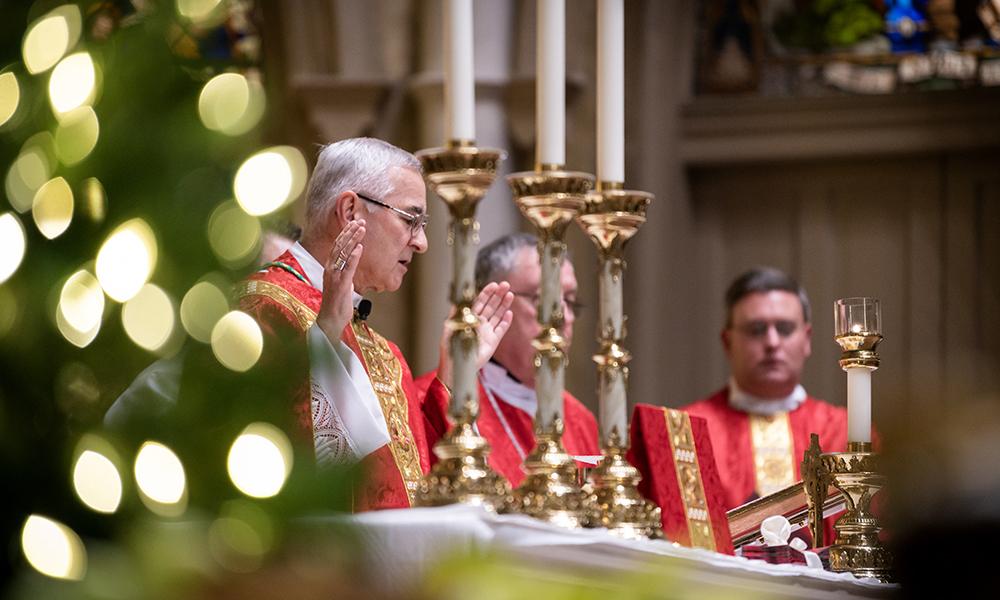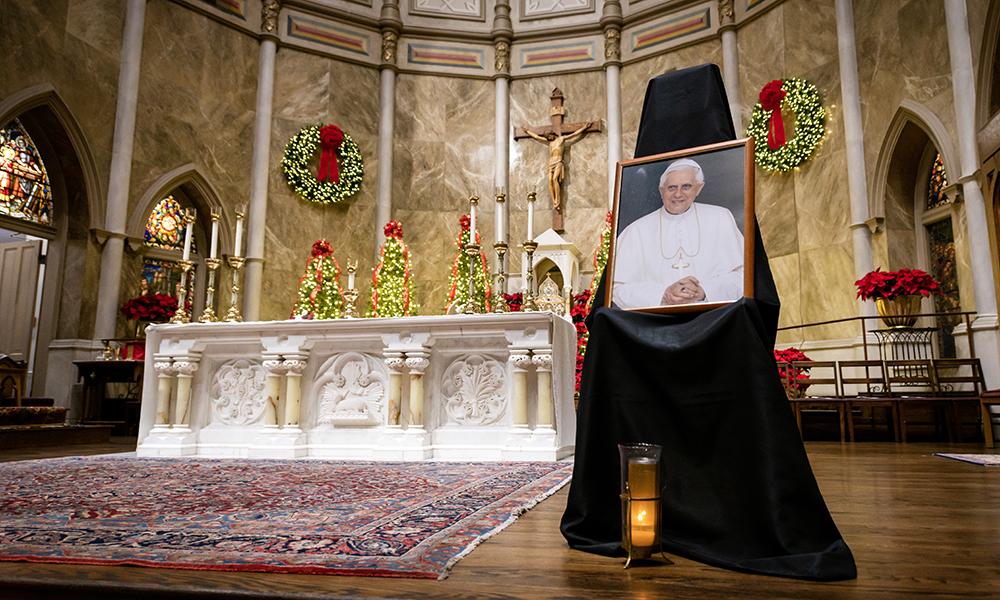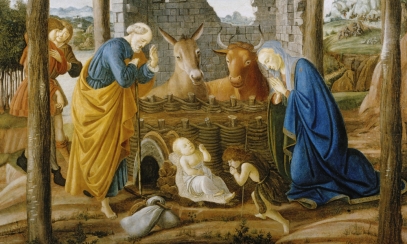
‘Lord, I Love You’
Bishop Raica Celebrates Two Requiem Masses for Pope Emeritus Benedict XVI
Bishop Raica Celebrates Two Requiem Masses for Pope Emeritus Benedict XVI
On Jan. 3, Bishop Raica celebrated a Mass for the Dead, or Requiem Mass for Pope Emeritus Benedict XVI at the Cathedral of St. Paul in Birmingham. On Jan. 4, the bishop celebrated the second Requiem Mass for the deceased pope at Holy Spirit Catholic Church in Huntsville. The complete text of his homily follows herein.
On Jan. 3, Bishop Raica celebrated a Mass for the Dead, or Requiem Mass for Pope Emeritus Benedict XVI at the Cathedral of St. Paul in Birmingham. On Jan. 4, the bishop celebrated the second Requiem Mass for the deceased pope at Holy Spirit Catholic Church in Huntsville. The complete text of his homily follows herein.
Dear sisters and brothers, I am grateful for the presence of Bishop Baker today at this Mass praying for the soul of Pope Emeritus Benedict XVI who passed away on Dec. 31, 2022, and will be buried on Thursday, Jan. 5, 2023, in Rome.
For the past week, as the worry about the decline in Pope Emeritus Benedict XVI’s health began to emerge across media platforms, it became clear that his transition to the loving arms of God’s mercy was imminent. Given his age and declining health, it was not a surprise. It is that moment in which we let go of everything, leave everything and everyone behind, and come face to face with our Creator. As Bishop of Birmingham in Alabama, I am very honored to offer a brief reflection tonight, taking into account the fact that I knew of Pope Benedict, as I knew of Cardinal Ratzinger, but I have to confess that I never met the man personally. Those who met him, who knew him, and collaborated with him in the Congregation of the Doctrine of the Faith, where he was the Prefect, to a person reported that he was a man of towering intellect who was willing to listen. He was a kind man who sought the truth in everything. It is also reported that he wanted above all to hear about your pastoral experiences, listening intently. Walking on the Christian journey together was more important for him. This was what I heard most often from those who had the privilege of engaging him during their ad limina visits. Those visits were open, cordial, fraternal, understanding, curious, and kind.
Today, I remember him as point of reference for many in the priesthood, including myself, and many among the lay faithful. For me, reading his articles, books, and homilies were personally fulfilling because of his clarity of thought and simplicity of expression. He was a theological intellectual giant who fought for the reasonableness of faith. Faith and reason, he believed, went hand in glove and could not be considered apart from each other. They were intertwined and interwoven in such a way that the truth became more self-evident and reasonable. But his more notable insights were so very basic. His writings, his homilies, his teachings, and lectures will perpetuate his legacy. They will be a point of reference for future research in the theological sciences. In his voracious desire to learn, he knew that the relationship he had with Christ was primary. Nothing, no research, no writing, his own life, would make sense apart from that relationship. He approached it so simply.
One’s final words which are oftentimes memorialized seem to have some kind of greater value and weight. Similarly, his final spiritual testament expressed his gratitude and wishes for all. Somehow, these two aspects reveal the true nature of one’s heart. We cling to them because they are so revelatory. His final words are reported to express that simplicity that every Christian should strive for: “Lord, I love You!” I believe this just didn’t happen accidentally or without preparation. It was the result of a lifetime of a companionship with Christ, an open heart and mind to the will and designs of the Lord Himself. It was like the two disciples meeting up with the Lord on the road to Emmaus. Were not our hearts burning inside us when he spoke to us on the way?
The relationship with the Lord always leaves us with hungers, thirsts, and burning hearts to satiate our curiosity about this man Jesus in our life.
The concluding chapter of St. John’s Gospel also illustrates this fact so well. Here is Peter who knew Christ like no one else. He was part of his inner circle and nominated to a primatial position to build the Church of Christ. When asked if he would leave, when challenged by the nature of the Eucharist, responded “Lord to whom shall we go? You have the words that give life!” Peter was keenly aware of his own limitations, failures, sins, insufficiencies, denials. Yet, after the resurrection, our Lord asked him straight up on the shore of the Sea of Galilee, “Simon, do you love Me?” He responded without hesitation, “Yes, Lord, I love You!” I can only guess that a disciple named Benedict, when at his last moment encountered Christ again on the seashore of heaven, was confronted with that same question that Jesus asked Peter: “Benedict, do you love me?” And his response was one of total abandonment: “Lord, I love You!” He knew the Lord when He came. He was ready for that moment when he would see his Lord face to face! All of his life prepared him for that decisive moment. More than a dissertation on a technical and obscure point in theology, it all boiled down to the simplicity of a relationship. “Lord, I love You!”
Somehow, I find that so inspiring as a legacy that he leaves behind for us. There are many technical points that we could elaborate on from his many books, homilies, and talks that he thoroughly researched so that he could know at the deepest level all the theological nuances. The heart of his own faith, which he didn’t consider unreasonable, came down to this point. “Lord, I love You!”
Today, we thank the Lord for this man’s genius, for his “yes” to the Lord’s call to be a priest, a bishop, a cardinal, and successor of Peter.
Finally, his spiritual testament leaves us with his final thought. Drawn from St. Paul’s letter to the Philippians, chapter 4, verse 1, he reminds us to remain steadfast. It reads, “… you whom I so love and long for, you who are my joy and my crown, continue, my dear ones, to ‘stand firm in the Lord.’” With all that distracts us today, here is a brother Christian, a companion with us, who was tested and remained faithful. He knew that his own physical stamina and mental stamina was waning when he resigned the pontificate in that surprising gesture of humility and acceptance. From his vantage point, standing firm in the Lord is something that all Christians need to consider today. Otherwise, to whom shall we go? My sisters and brothers, there is no one else, nothing else, that can have such an immense impact on our lives as our desire to be close to Christ, to allow us to be transformed by Him, and in the end, to abandon ourselves totally and completely to Him in that final act, affirming the only thing we can, “Lord, I love You!”
May the witness of this gentle soul, who led the church from 2005 – 2013 in the shoes of the fisherman, inspire us by his simple witness and request of us: “Stand firm in the Lord!” so we too can respond to the Jesus’ question to us: “Lord, I love you!”
For funeral coverage, please click here.




